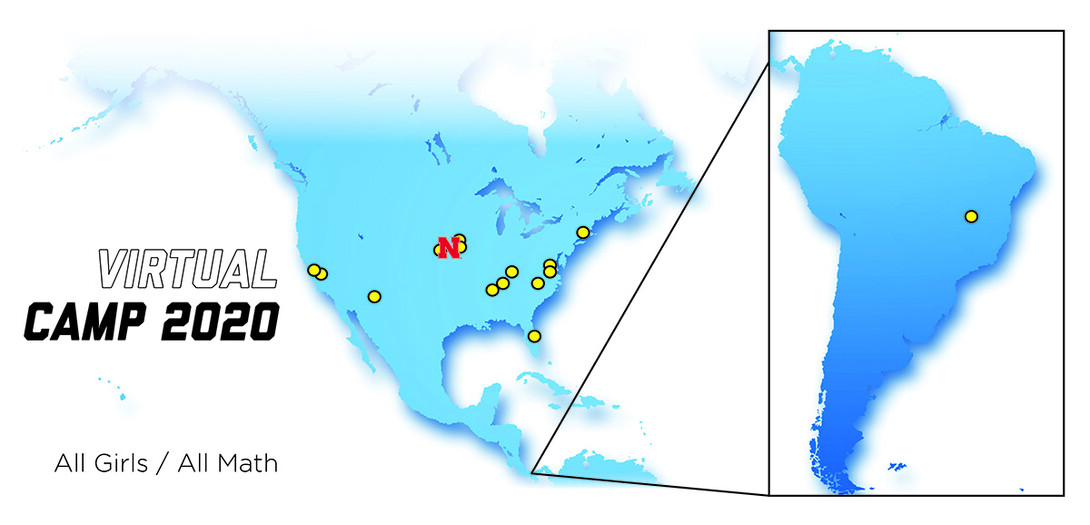
Transitioning the 24th annual All Girls/All Math high school summer camp to an online experience turned into a lesson in creative adaptation for the camp’s undergraduate coordinator, Samantha Wolff.
Originally created by faculty Wendy Hines and Judy Walker in 1997, All Girls/All Math has grown to be a nationally renowned summer program that fosters lasting connections and talented future mathematicians.
When Wolff, a senior secondary science education major graduating in December, joined the summer camp staff at the beginning of the year, she was determined to help continue the program’s mission of providing high school girls with an opportunity to network and sharpen their math skills during the one-week residential camp at the University of Nebraska-Lincoln. However, when the university announced its switch to remote operations until the fall semester, she and the coordinating staff had to rapidly shift gears.
Without a clear model for transitioning an in-person camp to a virtual setting, Wolff and the All Girls/All Math team of faculty and staff quickly recognized that preserving the camp’s sense of community would be both the largest planning obstacle and the most necessary focus of this year’s program.
While this year’s applicants were given the option to defer their acceptance to the program until 2021, one student from Brazil and 14 campers from across the United States opted to attend All Girls/All Math, at no cost, online. It was possible to offer the camp for free because of the generous support of AMS Epsilon, the NSF/EPSCoR grant to Nebraska and the university’s Center for Science, Mathematics and Computer Education.
The center’s program staff understood that to foster tight-knit friendships in an online camp, it was imperative to incorporate effective and engaging virtual activities throughout the weeklong schedule that would mitigate the loss of in-person interaction.
After months of consulting with lead instructor Marla Williams and events coordinator Stephanie Vendetti to brainstorm ways to conduct an impactful online experience, Wolff felt confident in the adjusted camp curriculum. Coupled with a bit of practice using Zoom, Wolff’s creative thinking led the team to successfully execute an innovative virtual camp from July 12-18.
Wolff and Williams worked closely to ensure that collaboration would be a central component of the campers’ daily cryptology and number theory course. Because the students were not assigned homework during the online camp, extra class time gave the girls opportunities to solve difficult problems and discuss solutions together, which strengthened their bond as a group.
Wolff also enlisted the help of mathematics major Taylor Bartek to design interactive networking activities online to keep the 15 campers engaged. The campers took part in solving a virtual escape room, went on virtual tours of Duncan Aviation and the Nebraska State Capitol, and participated in online workshops with Morrill Hall and the National Museum of Mathematics of New York City.
They also fired off questions to two panels — one on careers with women mathematicians from a variety of careers and one with undergraduate students in STEM majors at the university.
“The panels were a great success and definitely one of the highlights for the girls,” Wolff said. “We had a very diverse group of experience on the panels that was helpful for the campers to hear from.”
A week before camp, Wolff created a GroupMe to help the girls get acquainted, and instead of dividing campers into separate groups, all of the girls worked as one team throughout the week.
“By the time they logged on for the first day of camp, they had already established a banter and familiarity among themselves that energized the rest of the week,” Wolff said.
The camp kicked off with the girls eagerly opening their surprise boxes, filled with swag, together on Zoom. They were welcomed by Associate Professor Yu Jin, camp faculty director; Professor Tom Marley, chair of the Department of Mathematics; and camp alumna Magnolia Chinn. Chinn discussed how the camp motivated her to seek similar female-driven opportunities in STEM as an undergraduate student.
While the majority of All Girls/All Math online maintained a similar structure to the in-person camp, instead of attending a mini-course on a different mathematics topic every day, the girls had one course on the model of infectious diseases on the last day of camp to help them learn more about the applications of math to the current global health crisis.
However, “stand and share,” a Zoom talent show that allowed the campers to display their other skills and interests to the rest of the group, proved to be the highlight of the week. After witnessing the campers’ show of support and excitement for one another, it became clear to Wolff that this activity solidified the camaraderie the girls had been developing all week.
“‘Show and share’ was the best,” Wolff said. “We didn’t even stick to the planned networking activity we had scheduled afterward that night because the girls were all so comfortable with each other.”
During the farewell chat, the participants’ parents joined and the girls discussed all they had learned and completed throughout the week.
“Each student cited various elements of the camp as a personal favorite, but nearly every camper noted that the friendships they made and the support they received during the week were integral to both their experience and their summer,” Wolff said.
By continuing to provide young women with the opportunity to learn alongside current events and make connections in this time of uncertainty and social isolation, All Girls/All Math led this group of students to find and create a solid support system from around the world.







